Florida’s Renewable Energy Goals and Logistical Requirements
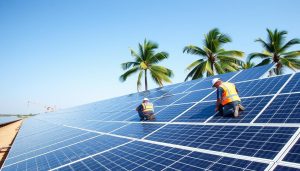
Florida has set ambitious targets to diversify its energy portfolio and reduce carbon emissions. Major utilities like Florida Power & Light have launched initiatives such as the “30-by-30” plan, which aims to install 30 million solar panels by 2030. Additionally, the Florida Municipal Solar Project represents one of the largest municipal-backed solar projects in the United States, spanning 16 counties with approximately 1.5 million solar panels.
These renewable energy initiatives create specific logistical requirements across three primary sectors:
Solar Energy Logistics
As Florida’s dominant renewable resource, solar energy requires specialized handling for fragile photovoltaic panels, inverters, and mounting systems. The state’s 220+ days of annual sunshine have attracted major solar developments, creating significant demand for specialized transportation and storage solutions.
Biofuel Transportation
Florida’s agricultural sector produces substantial biomass that can be converted to biofuels. Moving feedstock from farms to processing facilities and then distributing the finished biofuels requires specialized containment systems and compliance with hazardous materials regulations.
Emerging Wind Energy
While onshore wind has limited potential in Florida, offshore wind development presents unique logistics challenges. Transporting massive turbine components through ports and to offshore installation sites demands specialized equipment and careful planning.
Battery Storage Systems
Energy storage is critical to renewable implementation. The transportation of lithium-ion batteries and other storage technologies requires adherence to strict safety protocols and temperature-controlled environments throughout the supply chain.
Current Infrastructure for Renewable Energy Logistics
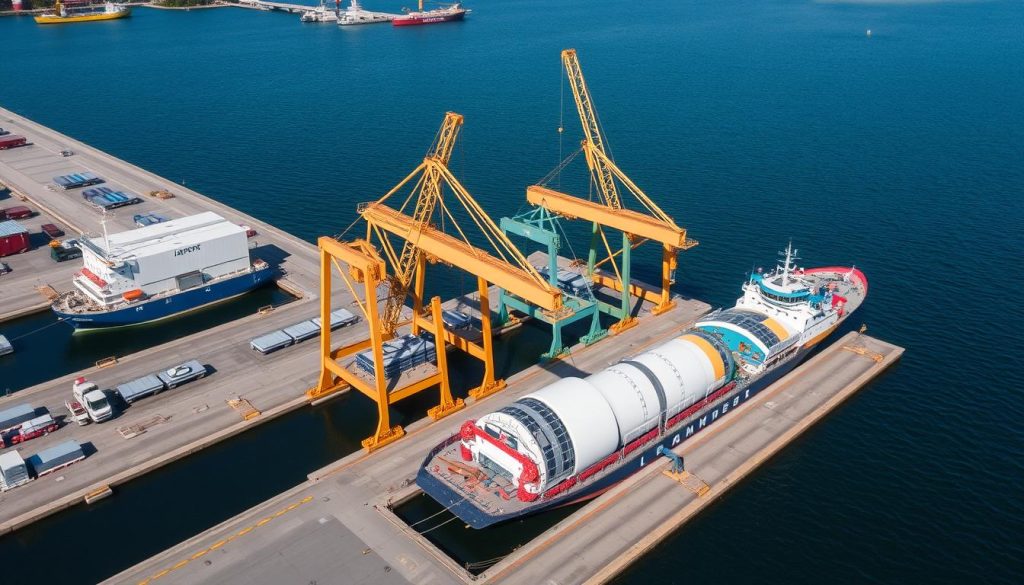
JAXPORT facilities equipped for handling specialized renewable energy cargo
Florida’s existing logistics infrastructure provides both advantages and limitations for renewable energy transportation. The state’s strategic position offers excellent access to international shipping lanes, but specialized requirements for renewable components demand purpose-built solutions.
Port Facilities
Florida’s deep-water ports, particularly JAXPORT in Jacksonville, have emerged as critical hubs for renewable energy logistics. These facilities have reported significant growth in solar cargo, with JAXPORT handling 12,743 TEUs (twenty-foot equivalent units) of solar panels in 2019, representing a 137% increase from the previous year. Specialized stevedoring services at these ports can unload delicate components with turn times as quick as 18 minutes for two-way moves.
Warehousing and Distribution
Specialized warehousing facilities have developed throughout Florida to accommodate the unique requirements of renewable energy components. Companies like Aqua Gulf have invested in temperature-controlled storage spaces specifically designed for solar panels and other sensitive equipment. These facilities often incorporate their own renewable energy systems, with Aqua Gulf’s Jacksonville warehouse featuring a 62,000-square-foot solar array generating 2.25 megawatts daily. South Florida also has mutiple providers for Bonded Warehouses plus temperature controlled facilities that are near Port Everglades and Port of Miami.
Transportation Networks
Florida’s extensive highway system provides good connectivity for ground transportation, with three major interstates facilitating quick delivery from ports to installation sites. However, the oversized nature of many renewable components, particularly wind turbine blades that can exceed 60 meters in length, creates significant challenges for road transportation.
Grid Connection Infrastructure
The logistics of connecting renewable energy projects to the grid represents another critical infrastructure component. Florida’s utilities have been upgrading interconnection facilities to accommodate the growing number of solar installations, though bottlenecks still exist in some regions where grid capacity hasn’t kept pace with renewable development.
Key Logistical Challenges in Florida’s Renewable Energy Sector
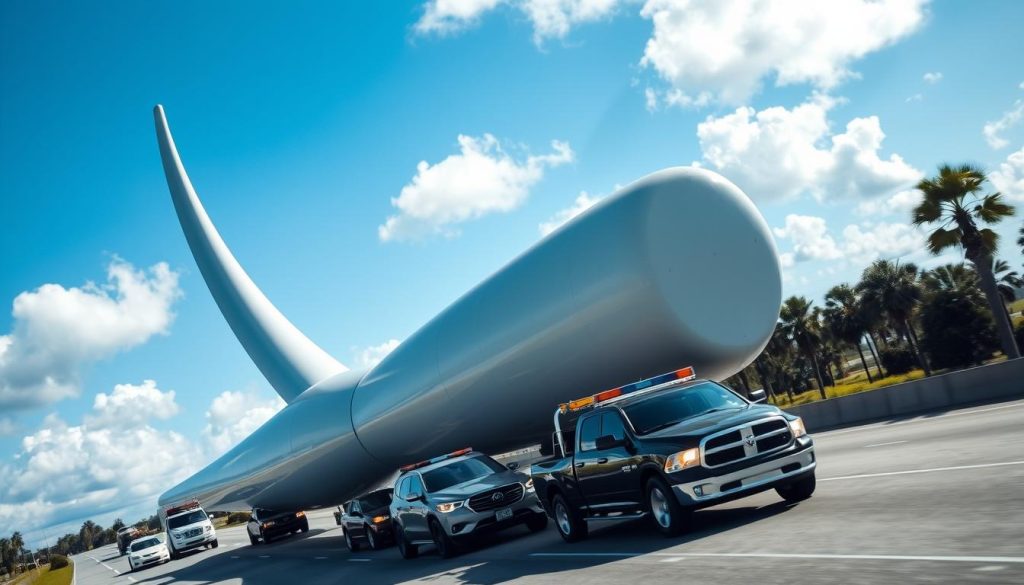
Oversized renewable energy components present unique transportation challenges in Florida
Challenge 1: Hurricane Vulnerability
- Florida’s hurricane season creates significant risks for both in-transit and stored renewable components
- Solar panels and wind turbine parts require hurricane-resistant storage facilities
- Transportation schedules must account for potential weather disruptions from June through November
- Insurance costs for renewable energy logistics are higher due to storm risks
- Emergency relocation plans must be established for components in vulnerable coastal areas
Challenge 2: Land Use Conflicts
- Competition between agricultural, residential, and renewable energy uses drives up land costs
- Limited suitable land for large-scale staging areas near installation sites
- Environmental regulations protect wetlands and wildlife habitats, restricting logistics operations
- Urban congestion around major ports complicates last-mile delivery
- Tourism considerations limit transportation options in heavily visited areas
Challenge 3: Regulatory Complexity
- Navigating permits for oversized loads across multiple county jurisdictions
- Compliance with hazardous materials regulations for battery components
- Varying local regulations for solar installation create inconsistent logistics requirements
- International shipping regulations add complexity for imported components
- Evolving renewable energy policies create uncertainty for long-term logistics planning
Challenge 4: Specialized Equipment Shortages
- Limited availability of specialized trailers for solar panel and wind turbine transportation
- Shortage of cranes capable of handling oversized renewable components
- Insufficient temperature-controlled storage facilities for battery components
- Skilled labor shortages for specialized handling of delicate renewable equipment
- High capital costs for purpose-built renewable energy logistics equipment
Need Secure, Duty-Deferred Storage or Drayage for Solar Panels?
Based in Dania Beach, our South Florida Logistics company specializes in drayage trucking and customs bonded warehouse storage for solar panels coming into Port Everglades or Port of Miami. We can help streamline your supply chain while deferring import duties.
Innovative Solutions Transforming Renewable Energy Logistics
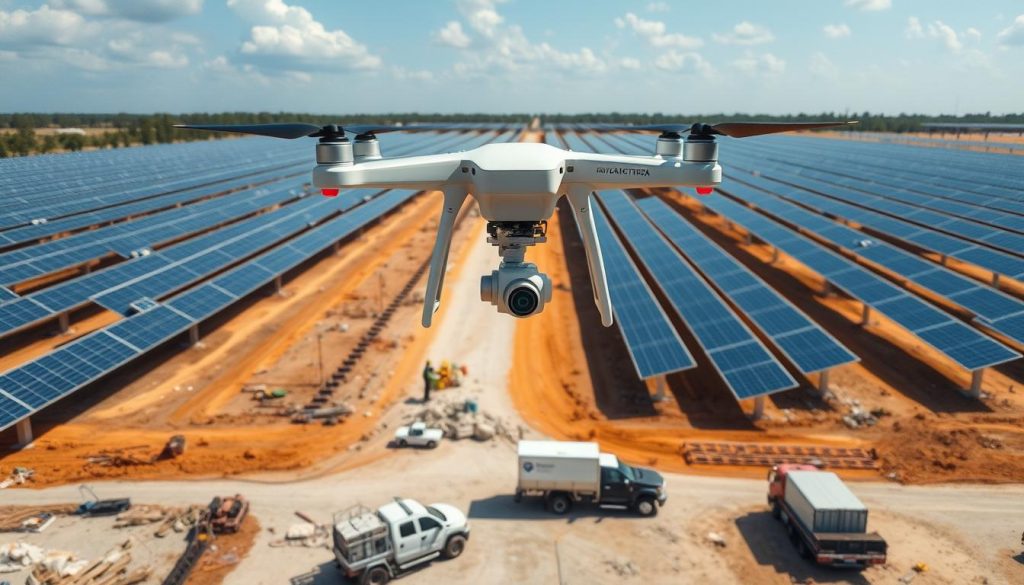
Advanced drone technology enabling precise logistics monitoring at renewable energy sites
Despite the challenges, Florida’s renewable energy sector has developed innovative logistics solutions that are setting new standards for efficiency and sustainability. These innovations address the unique demands of transporting and storing renewable energy components in the Sunshine State.
Foreign Trade Zone Utilization
JAXPORT serves as the grantee for Foreign Trade Zone (FTZ) No. 64, the largest zone in Florida, encompassing nine counties and 5,000 square miles. This designation provides significant advantages for renewable energy logistics, including duty deferral, inverted tariff relief, and inventory tax benefits. Companies like Shoreside Logistics have obtained FTZ designations specifically to support solar panel imports, allowing them to manage cash flow while coordinating just-in-time delivery to installation sites. South Florida is also a prime hub for FTZ Warehouse operations, with port authorities like Port Everglades actively assisting 3PL Providers in establishing FTZ-designated facilities.
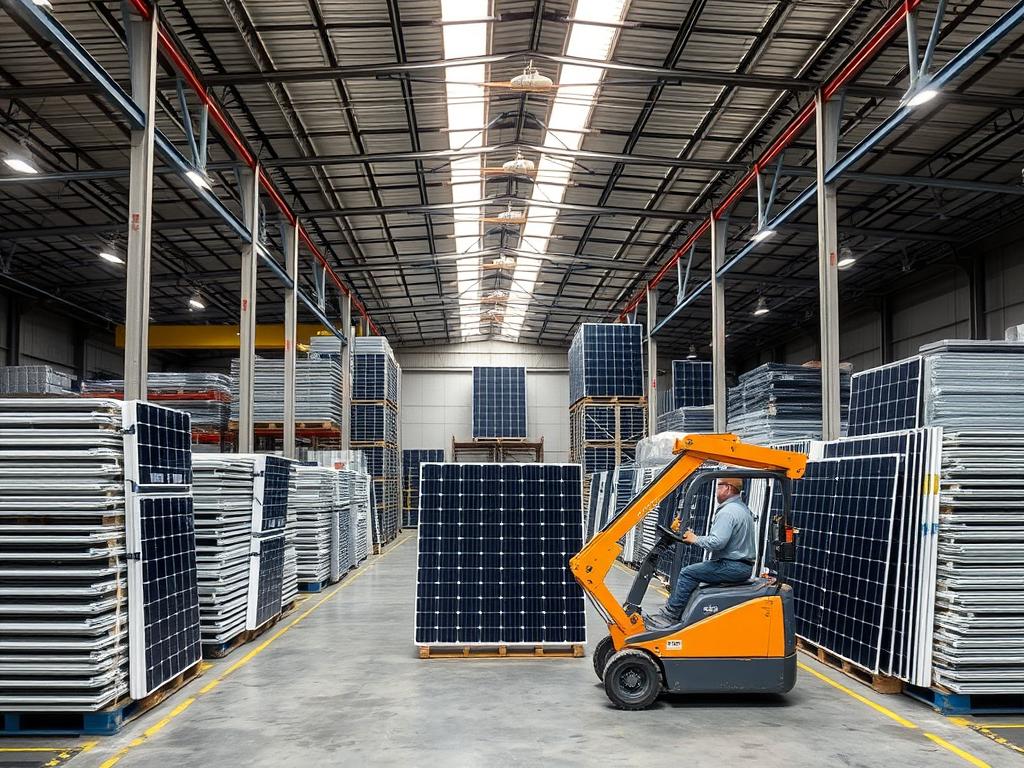
Foreign Trade Zone warehouse optimized for solar panel storage and distribution
Specialized Multi-Modal Transportation
Logistics providers have developed customized transportation solutions combining sea, rail, and road options to optimize renewable energy component movement. For example, solar panels arriving at JAXPORT are often transferred from 40-foot international containers to 53-foot domestic containers, reducing the number of required trips by approximately 16% while accelerating the return of shipping containers to port.
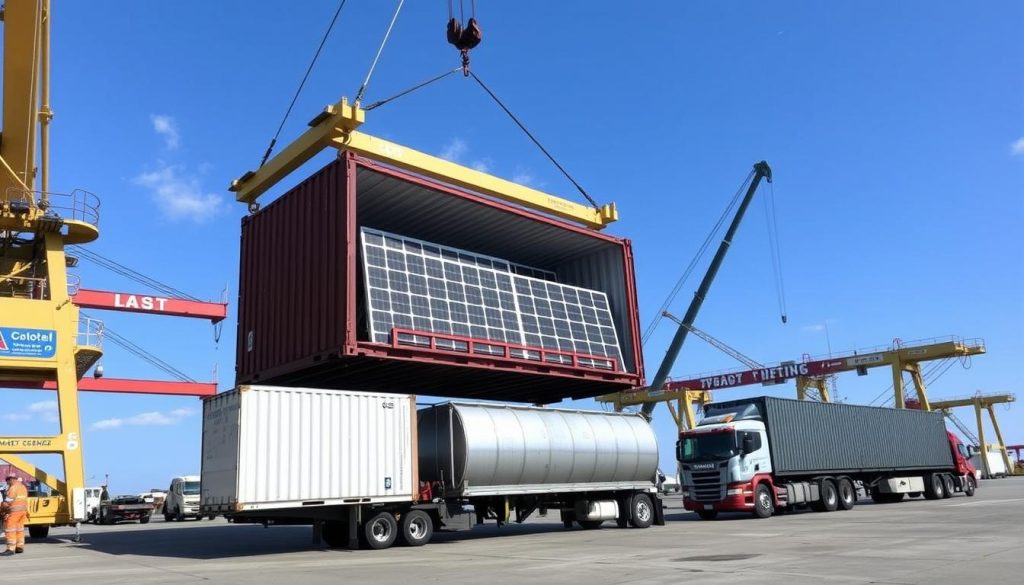
Transfer operations between international and domestic shipping containers for renewable components
Technology-Enabled Logistics Management
Advanced technology solutions have revolutionized renewable energy logistics in Florida. IoT sensors provide real-time monitoring of sensitive components during transit, while GPS tracking enhances route optimization for oversized loads. Blockchain technology is increasingly being deployed to improve supply chain transparency and streamline customs clearance for international shipments.
| Technology Solution | Application in Renewable Energy Logistics | Key Benefits |
| IoT Sensors | Real-time monitoring of temperature, humidity, and shock for sensitive components | Reduced damage rates, improved quality control, proactive issue resolution |
| AI-Powered Route Optimization | Dynamic planning for oversized load transportation | Reduced transit times, lower fuel consumption, decreased emissions |
| Blockchain Documentation | Secure tracking of component origin, specifications, and handling requirements | Streamlined customs clearance, improved compliance verification, enhanced transparency |
| Mobile Applications | Real-time communication between drivers, dispatchers, and project managers | Improved coordination, faster problem resolution, enhanced delivery precision |
Case Study: JinkoSolar Manufacturing Success in Jacksonville
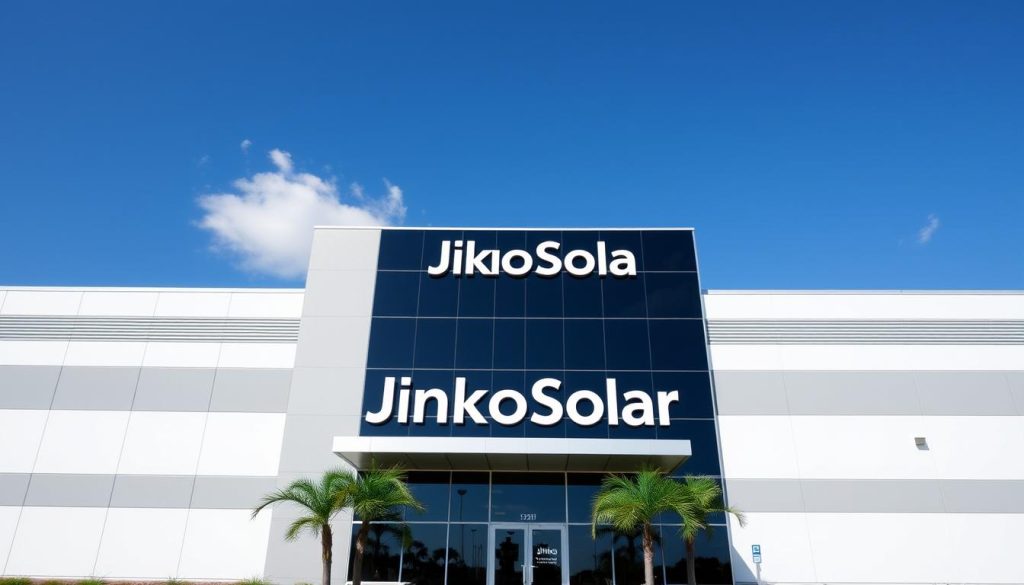
JinkoSolar’s manufacturing facility represents a major renewable energy logistics success in Florida
One of Florida’s most significant renewable energy logistics success stories is the establishment of JinkoSolar’s manufacturing facility in Jacksonville. This high-tech plant, one of the largest solar manufacturing operations in the United States, demonstrates how effective logistics planning can support renewable energy manufacturing.
Project Overview
JinkoSolar, a global leader in solar panel manufacturing, chose Jacksonville for its first U.S. production facility specifically because of the region’s logistics advantages. The facility produces the company’s Eagle G2 solar modules for both residential and commercial applications, with components sourced internationally and finished products distributed throughout the United States.
Logistics Solutions Implemented
Port Proximity Advantage
JinkoSolar leverages JAXPORT’s three weekly direct ocean carrier calls from Asian markets to receive raw materials efficiently. The port’s proximity to the manufacturing facility minimizes inland transportation costs and reduces carbon emissions associated with component delivery.
Integrated Supply Chain
The company implemented a sophisticated supply chain management system that coordinates inbound materials from global sources with production schedules and outbound distribution of finished panels. This integration ensures optimal inventory levels and production efficiency.
Multi-Modal Distribution
Finished solar panels are distributed through a combination of truck, rail, and occasionally air freight to reach installation sites throughout the United States. This flexible approach allows JinkoSolar to optimize delivery times and transportation costs based on project requirements.
Tax and Regulatory Advantages
The company benefits from Florida’s favorable tax climate and the logistical advantages of operating within proximity to Foreign Trade Zone No. 64, which provides flexibility in managing international component sourcing and customs clearance.
Results and Impact
JinkoSolar’s Jacksonville facility has created hundreds of jobs while establishing a domestic manufacturing presence that reduces the logistics complexity for U.S. solar projects. The success of this operation demonstrates how strategic logistics planning can support renewable energy manufacturing and distribution in Florida, creating both economic and environmental benefits.
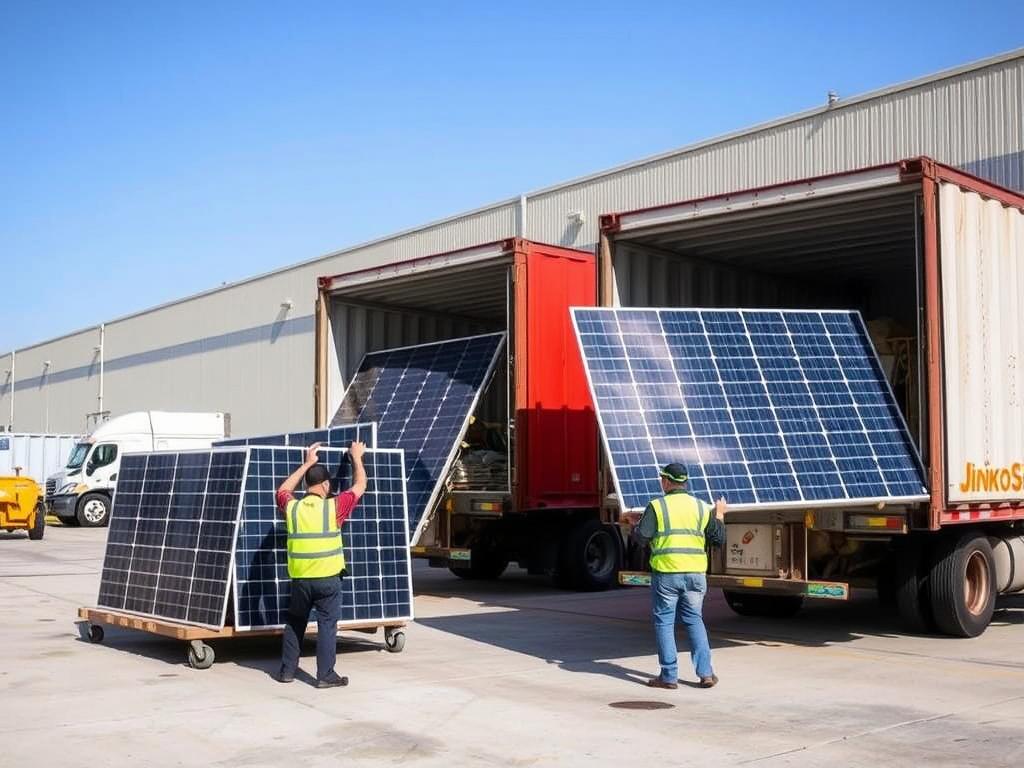
Distribution operations for domestically manufactured solar panels reduce logistics complexity
Future Trends in Florida’s Renewable Energy Logistics
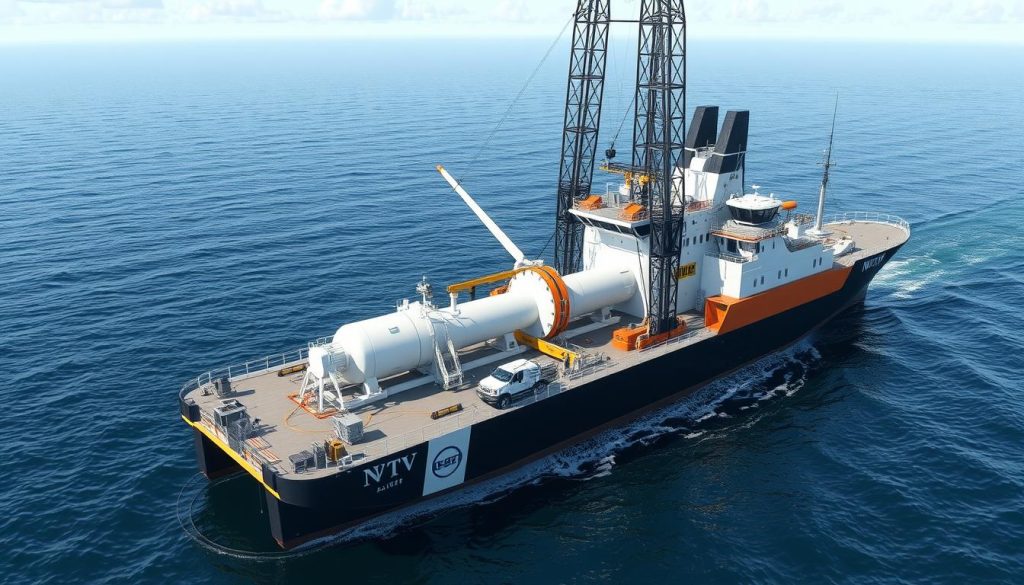
Offshore wind development represents an emerging frontier for renewable energy logistics in Florida
The renewable energy logistics landscape in Florida continues to evolve rapidly, with several emerging trends poised to reshape the sector in coming years. These developments will create both new challenges and opportunities for logistics providers serving the renewable energy industry.
Offshore Wind Logistics Development
While Florida’s offshore wind potential remains largely untapped, preliminary assessments indicate significant resources, particularly along the Atlantic coast. The development of offshore wind will require specialized port infrastructure, including heavy-lift capabilities, sufficient laydown areas, and vessels designed for turbine installation. Ports like JAXPORT are already evaluating infrastructure improvements to position themselves for this emerging opportunity.
Hydrogen Fuel Transportation
As Florida explores hydrogen as a clean energy carrier, specialized logistics solutions for hydrogen production, storage, and distribution are emerging. This includes cryogenic transportation for liquid hydrogen, specialized pipelines, and safety protocols for handling this highly combustible fuel. The Port of Tampa Bay has already begun exploring hydrogen hub development that would integrate production and distribution capabilities.
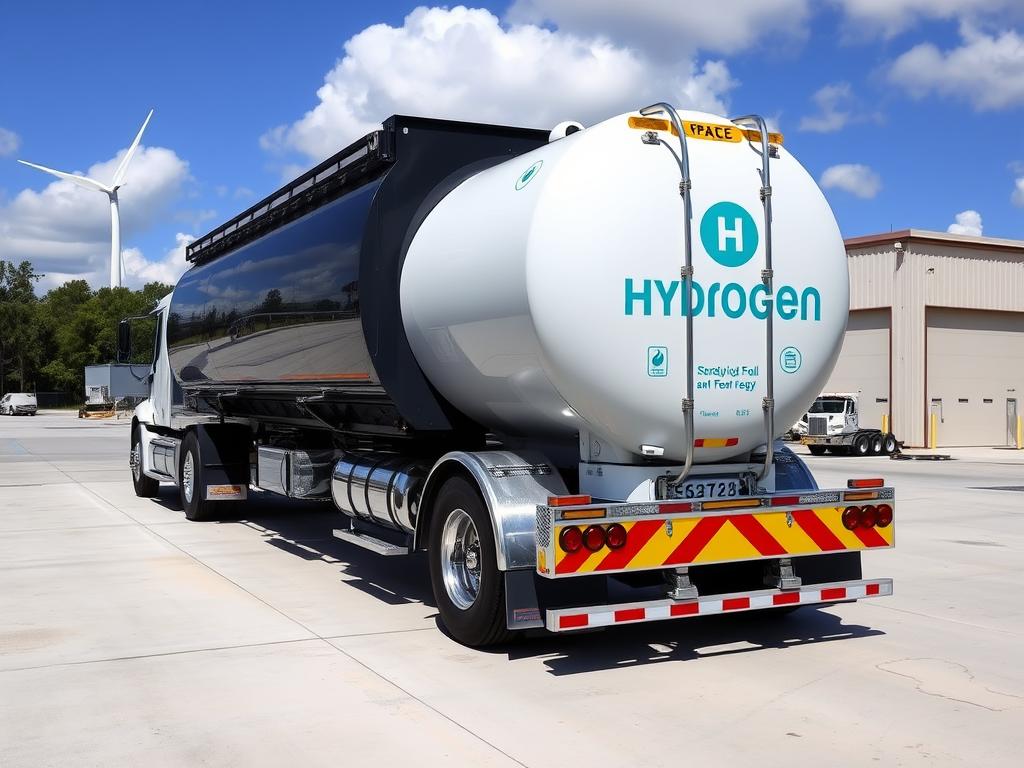
Specialized transportation solutions for hydrogen fuel represent an emerging logistics frontier
Electrification of Logistics Operations
The renewable energy logistics sector itself is increasingly adopting clean energy solutions. Companies like Aqua Gulf have installed solar arrays on warehouses, while transportation providers are beginning to deploy electric trucks for component delivery. This trend toward electrification creates a virtuous cycle where renewable energy logistics becomes increasingly powered by the very energy sources it supports.
Advanced Energy Storage Logistics
As battery technology evolves and grid-scale energy storage deployments increase, specialized logistics for battery transportation, installation, and eventual recycling will become increasingly important. This includes temperature-controlled transportation, specialized handling equipment, and safety protocols for managing the unique risks associated with large-scale battery systems.
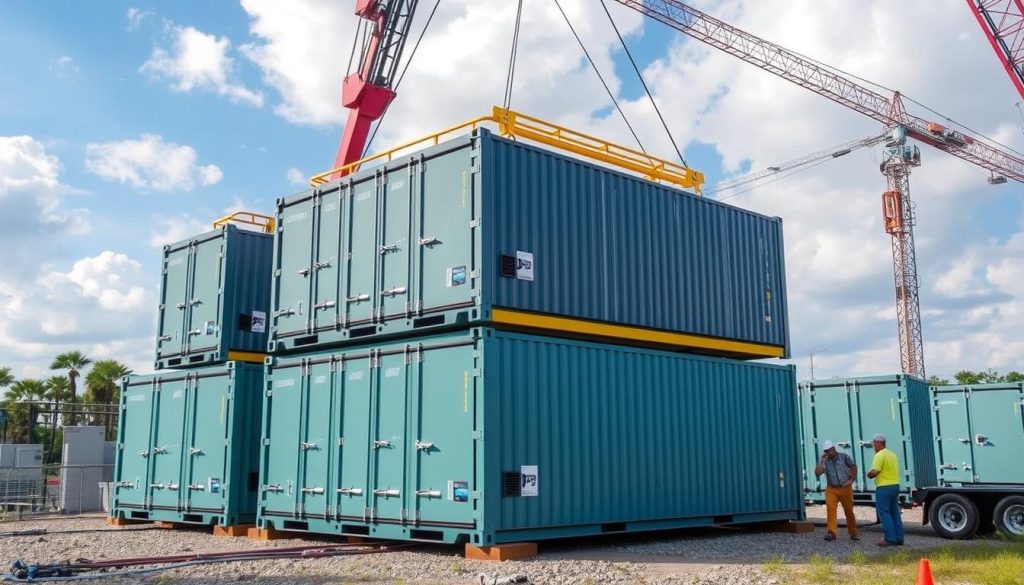
Grid-scale battery storage installations require specialized logistics solutions
Strengthening Public-Private Partnerships for Renewable Energy Logistics
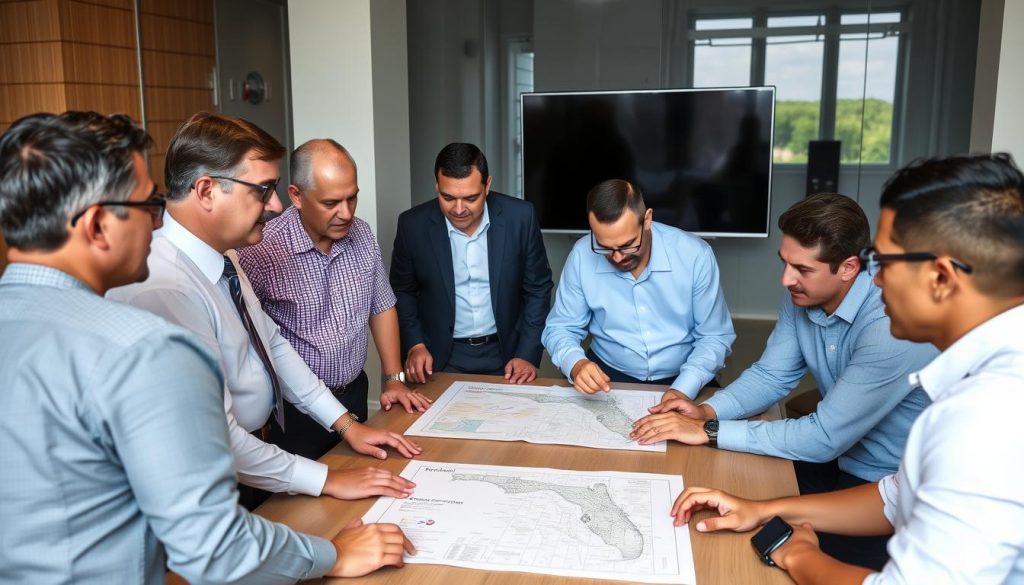
Collaborative planning between public and private stakeholders drives renewable energy logistics innovation
The future success of renewable energy logistics in Florida depends significantly on effective collaboration between government agencies, private logistics providers, and renewable energy developers. These partnerships can address infrastructure gaps, streamline regulatory processes, and create innovative solutions to the unique challenges facing the sector.
Key Partnership Opportunities
Infrastructure Investment
Joint funding for specialized port facilities, road improvements for oversized loads, and strategic storage facilities can address critical infrastructure gaps. Public investment in these shared resources can reduce costs for individual projects while creating long-term economic benefits.
Regulatory Harmonization
Collaboration between state agencies, local governments, and industry stakeholders can streamline permitting processes and create consistent standards for renewable energy logistics across jurisdictions, reducing administrative burdens and project delays.
Workforce Development
Partnerships between educational institutions, government agencies, and private companies can develop training programs for the specialized skills needed in renewable energy logistics, addressing labor shortages and creating quality job opportunities.
The renewable energy transition represents a tremendous opportunity for Florida’s economy and environment. By strengthening public-private partnerships focused on logistics infrastructure and operations, the state can accelerate this transition while creating jobs and establishing itself as a leader in clean energy deployment.
Partner With a Trusted South Florida Logistics Provider
Located just minutes from Port Everglades, our bonded warehouse and solar-focused trucking services give you an edge in renewable energy distribution. Whether importing solar panels or staging for installation, we have the space to accomodate.
Conclusion: Powering Florida’s Sustainable Future Through Logistics Excellence
Florida stands at a pivotal moment in its renewable energy journey. The state’s abundant solar resources, growing biofuel production, and emerging offshore wind potential position it for leadership in clean energy generation. However, realizing this potential depends significantly on overcoming the unique logistics challenges that accompany renewable energy development in the Sunshine State.
From hurricane vulnerability and land use conflicts to regulatory complexity and specialized equipment needs, these challenges require innovative solutions and collaborative approaches. The success stories highlighted in this analysis demonstrate that when logistics excellence meets renewable energy ambition, transformative projects become possible.
As Florida continues its transition toward a cleaner energy future, the logistics infrastructure and expertise supporting this transition will play an increasingly critical role. By strengthening public-private partnerships, embracing technological innovation, and developing specialized capabilities, Florida can build a renewable energy logistics ecosystem that not only supports its own clean energy goals but serves as a model for other regions facing similar challenges.
The path forward requires commitment from all stakeholders—government agencies, private logistics providers, renewable energy developers, and communities throughout the state. Together, these partners can create a logistics framework that accelerates Florida’s renewable energy transition while maximizing economic benefits and minimizing environmental impacts.
Popular Posts
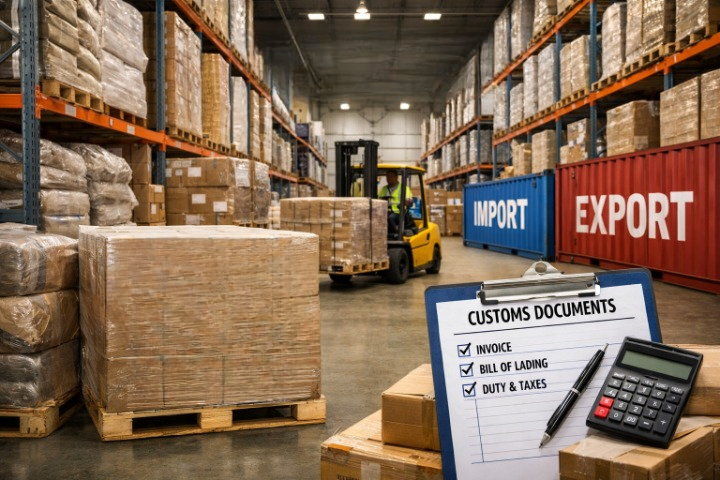
December 31, 2025
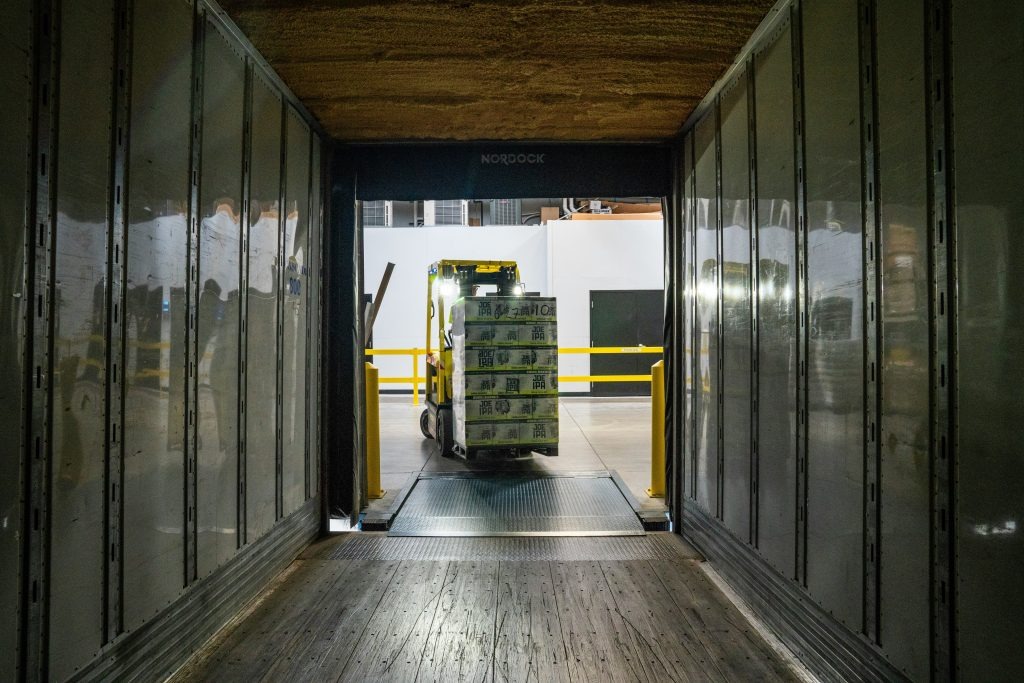
November 20, 2025
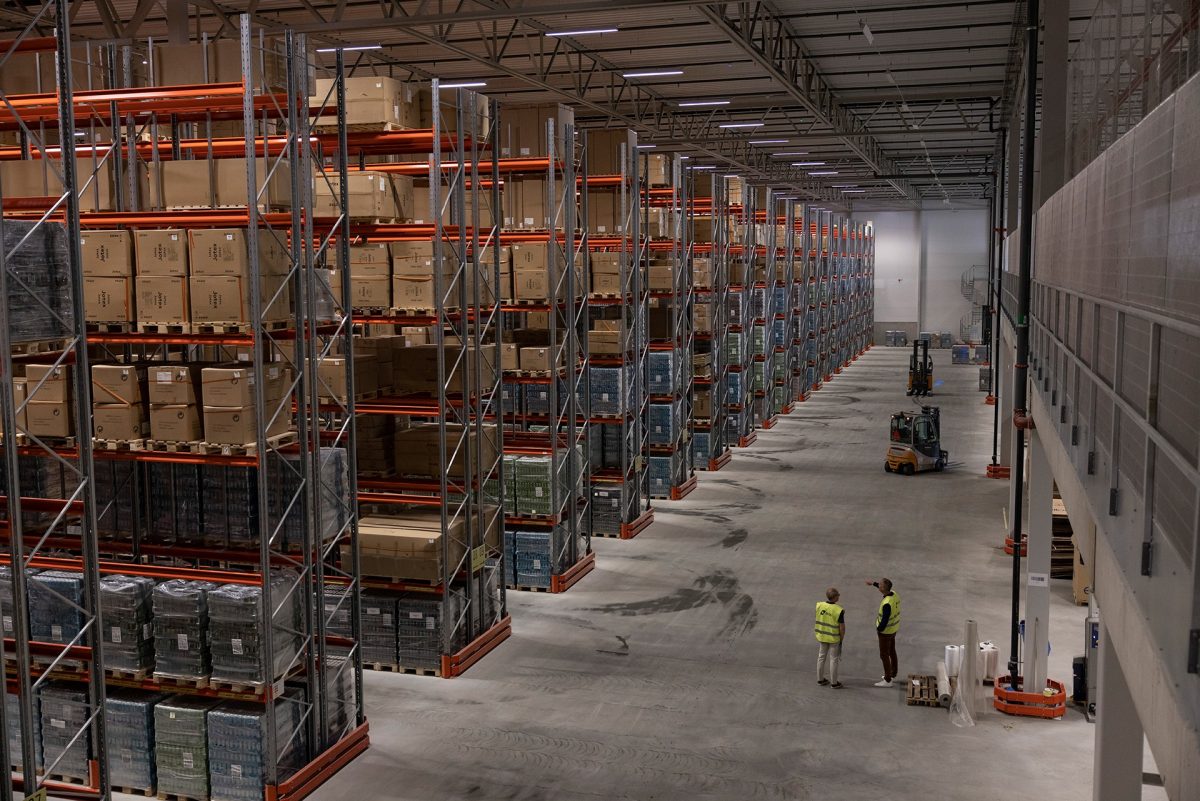
Post A Comment